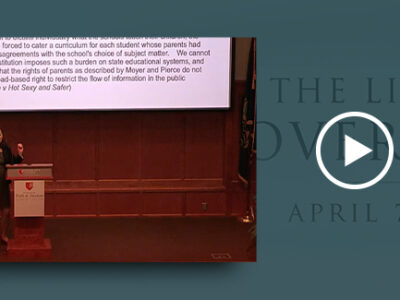One of the most contentious debates in education — sex education, contraceptives vs. abstinence — has become more important. At least four studies have found that there is a meaningful number of adolescent women who desire to become pregnant in the near future.
Clearly, teaching students how to use condoms correctly will have no effect on young women who want to become pregnant. Safe sex programs will do nothing to give these women a future and a hope.
The proponents of safe sex programs tell us that adolescents are going to have sex because of the pleasure and hormones, not because some adolescent women want a baby. Yet a recent study conducted by researchers at the University of Alabama at Birmingham found that among sexually active lower socio-economic status women (with an average age of 16) 23.6% expressed a desire to become pregnant in the near future and an additional 12.8% already were pregnant! These women are willfully choosing to risk continuing in the poverty that teenage mothers routinely endure. They deserve better than to be taught how to put a condom on a cucumber.
Serving on the board of a pro-life pregnancy center has helped me understand the world of these women. Our clients will gratify the sexual desires of their male partners while they receive no similar gratification themselves. In addition. many of these young women will engage in sexual activity while taking no precautions against pregnancy. They know how to reduce their risks of pregnancy through contraception, they simply choose not to use contraception.
Why would young women do such things? They feel unloved and hold no hope for the future. Thus they are willing to be low paid prostitutes hoping the males in their lives will love them. They are willing to risk pregnancy, even hope for it, because surely their babies will love them. Research shows that one of the best predictors of sexual abstinence is having high educational goals for one’s self. The clients at our center have low skill levels and cannot imagine that things could be different. A typical school based abstinence program may be very effective for middle class students who know they are loved and believe they have a future. Upholding morality and teaching the value of delaying gratification is important. Yet, a clear inference from research is that before we can teach abstinence, we need to give hope.
Of the teenage women in the University of Alabama at Birmingham study, those with a desire to become pregnant were significantly more likely to believe that the only dating option they had was the male they were currently seeing. This emphasizes the fact that young women with a desire to become pregnant feel neither lovable, nor hopeful. They may not love the male they are with, but they believe they have no other options.
The debates about what type of sex education programs are best usually focus on what type of program should be government funded and taught in the schools. Concerned citizens are rightly cautious about accepting government funding and they often find influencing public school curricula challenging. There are ways we can help these vulnerable members of our society that do not require government funding and public school access.
There are many effective organizations, such as Pregnancy Services of Western Pennsylvania, that serve women, and men, who feel unlovable and hopeless. These organizations can hold people accountable for their behavior, unlike government programs. Thus clients are spurred to better themselves rather than stagnating with handouts. Social problems like teen pregnancy require teaching individual responsibility. Government programs are notoriously ineffective in promoting individual responsibility. Furthermore social service organizations that are free from government ties are freer to share faith in God with their clients.
When a person has eternal hope, she can have temporal hope. If a woman has hope, she has a reason to work towards living a life of individual responsibility. The tools to solve social problems, like teen pregnancy, via proven community based programs exist. If enough of us have the will to help those in need and offer them an attainable vision for a brighter tomorrow, one day the assumption that social problems have government solutions will be a thing of the past and more lives will be changed for the better.



